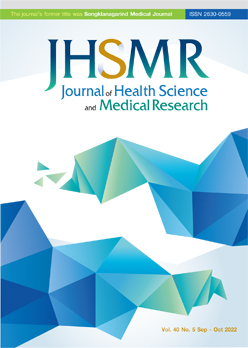Good Medication Adherence and its Association with Meaning in Life among Thai Individuals with Schizophrenia
DOI:
https://doi.org/10.31584/jhsmr.2022864Keywords:
adherence, meaning in life, medication, patient, schizophreniaAbstract
Objective: To study medication adherence, meaning in life, the association of medication adherence and meaning in life among Thai individuals with schizophrenia.
Material and Methods: This cross-sectional study surveyed all outpatient individuals with schizophrenia that followed up at the Psychiatric outpatient clinic, Songklanagarind Hospital. Three questionnaires were used:1) Demographic information 2) Medication adherence questionnaire and 3) The meaning in life questionnaire. Descriptive statistics were calculated using proportions, median and inter-quartile range (IQR) or mean and standard deviation (S.D.).
Results: According to the study period; from December 2020 to March 2021, there were 110 respondents. Most of the respondents (94.5%) attended regular follow-ups, via doctor’ appointments. The majority of them were male (56.4%), single (76.4%), and Buddhist (82.7%). The mean age was 42.3+11.8 years. According to the medication adherence questionnaire, all participants (100%) had good medication adherence scores. Concerning meaning in life, most of the participants had high scores in all subparts of meaning in life; the presence of meaning in life and looking for something that made their lives feel purposeful and meaningful. There was no relationship between meaning in life scores and demographic characteristics (p-value>0.050). As all participants (100%) had good medication adherence scores, the association between medication adherence and meaning in life could not be established in this study.
Conclusion: Most individuals with schizophrenia had good medication adherence as well as meaning in life. The search for meaning in life and meaning in taking medications may decrease negative medication attitudes and change the meaning of the illness.
References
Higashi K, Medic G, Littlewood KJ, Diez T, Granstrom O, De Hert M. Medication adherence in schizophrenia: factors influencing adherence and consequences of nonadherence, a systematic literature review. Ther Adv Psychopharmacol 2013; 3:200-18.
Fenton WS, Blyler CR, Heinssen RK. Determinants of medication compliance in schizophrenia: empirical and clinical findings. Schizophr Bull 1997;23:637-51.
Harrow M, Jobe TH. Factors involved in outcome and recovery in schizophrenia patients not on antipsychotic medications: a 15-year multifollow-up study. J Nerv Ment Dis 2007;195:406-14.
Acosta FJ, Hernandez JL, Pereira J, Herrera J, Rodriguez CJ. Medication adherence in schizophrenia. World J Psychiatry 2012;2:74-82.
Novick D, Haro JM, Suarez D, Perez V, Dittmann RW, Haddad PM. Predictors and clinical consequences of non-adherence with antipsychotic medication in the outpatient treatment of schizophrenia. Psychiatry Res 2010;176:109-13.
Acosta FJ, Bosch E, Sarmiento G, Juanes N, Caballero-Hidalgo A, Mayans T. Evaluation of noncompliance in schizophrenia patients using electronic monitoring (MEMS) and its relationship to sociodemographic, clinical and psychopathological variables. Schizophr Res 2009;107:213-7.
Hui CL, Chen EY, Kan CS, Yip KC, Law CW, Chiu CP. Detection of non-adherent behaviour in early psychosis. Aust N Z J Psychiatry 2006;40:446-51.
Robinson DG, Woerner MG, Alvir JM, Bilder RM, Hinrichsen GA, Lieberman JA. Predictors of medication discontinuation by patients with first-episode schizophrenia and schizoaffective disorder. Schizophr Res 2002;57:209-19.
Lieberman JA, Koreen AR, Chakos M, Sheitman B, Woerner M, Alvir JM, et al. Factors influencing treatment response and outcome of first-episode schizophrenia: implications for understanding the pathophysiology of schizophrenia. J Clin Psychiatry 1996;57:5-9.
Steger MF, Frazier P, Oishi S, Kaler M. The meaning in life questionnaire: assessing the presence of and search for meaning in life. J Couns Psychol 2006;53:80-93.
Steger MF, Frazier P. Meaning in life: one link in the chain from religion to well-being. J Couns Psychol 2005;52:574-82.
Taengbunngam S, Chincharoensup D,Vitayanont A. Attitudes towards mental illness of psychiatric patients, relatives of psychiatric patients and homeowners from a homestay family camp. J Psychiatr Assoc Thailand 2015;60:149-54.
Agrasuta T, Pitanupong J. Perceived stigma in patients with schizophrenia and caregivers in Songklanagarind Hospital: cross-sectional study. Songkla Med J 2017;35:37-45.
Pitanupong J, Rueangwiriyanan C. Caregiver burdens in patients with schizophrenia and related factors. J Ment Health Thai 2019;27:95-106.
Kane JM. Compliance issues in outpatient treatment. J Clin Psychopharmacol 1985;5:22S-7S.
Perkins DO. Predictors of noncompliance in patients with schizophrenia. J Clin Psychiatry 2002;63:1121-8.
Steger MF, Shin JY. The relevance of the Meaning in Life Questionnaire to therapeutic practice: a look at the initial evidence. International Forum for Logotherapy 2010;33:95-104.
Chomchoed O. Caregiving experiences, sense of coherence, and meaning in life among family caregivers of patients with invasive cancers [Thesis]. Bangkok: Chulalongkorn University; 2009.
Lieberman JA, Stroup TS, McEvoy JP, Swartz MS, Rosenheck RA, Perkins DO, et al. Effectiveness of antipsychotic drugs in patients with chronic schizophrenia. N Engl J Med 2005;353: 1209-23.
Zhou J, Xiang YT, Li Q, Zhu X, Li W, Ungvari GS, Ng CH, et al. Gender differences in attitudes towards antipsychotic in patients with schizophrenia. Pstchiatry Res 2016;245:276- 81.
Loots E, Goossens E, Vanwesemael T, Morrens M, Van Rompaey B, Dilles T. Interventions to improve medication adherence in patients with schizophrenia or bipolar disorders: a systematic review and meta-analysis. Int J Environ Res Public Health 2021; 18.
Olfson M, Marcus SC, Wilk J, West JC. Awareness of illness and nonadherence to antipsychotic medications among persons with schizophrenia. Psychiatr Serv 2006;57:205-11.
Velligan DI, Weiden PJ, Sajatovic M, Scott J, Carpenter D, Ross R, et al. The expert consensus guideline series: adherence problems in patients with serious and persistent mental illness. J Clin Psychiatry 2009;70:1-48.
Rettenbacher MA, Hofer A, Eder U, Hummer M, Kemmler G, Weiss EM, et al. Compliance in schizophrenia: psychopathology, side effects, and patients' attitudes toward the illness and medication. J Clin Psychiatry 2004;65:1211-8.
Hudson TJ, Owen RR, Thrush CR, Han X, Pyne JM, Thapa P, et al. A pilot study of barriers to medication adherence in schizophrenia. J Clin Psychiatry 2004;65:211-6.
Aunjitsakul W, Pitanupong J. Schizophrenias’ quality of life and emotional intelligence in Songklanagarind Hospital. Songkla Med J 2018;36:61-71.
Downloads
Published
How to Cite
Issue
Section
License

This work is licensed under a Creative Commons Attribution-NonCommercial-NoDerivatives 4.0 International License.
























